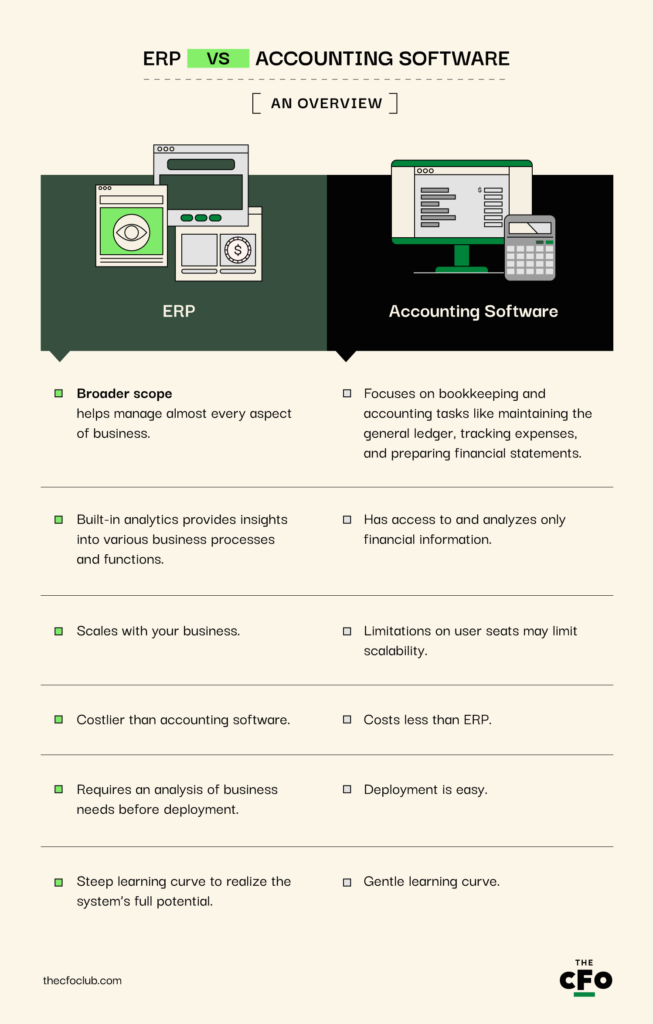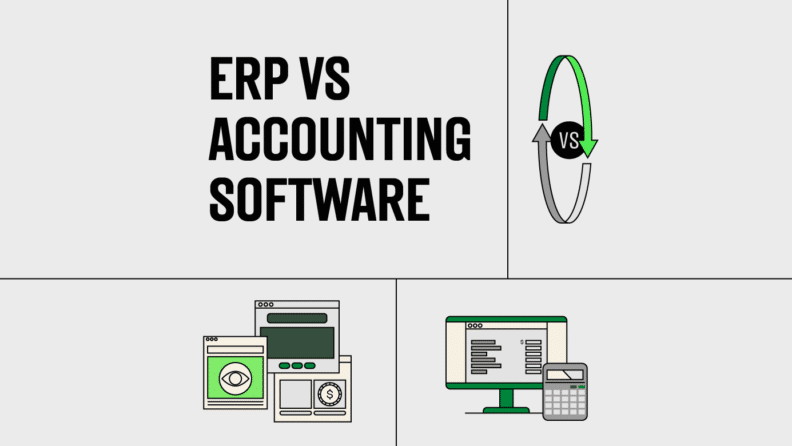The ERP vs. accounting software conundrum boils down to a tug-of-war between budget and functionality. ERP systems offer extensive capabilities for a higher price while accounting software costs less but only offers accounting and finance-specific features.
Many companies first choose an accounting system, and then transition to ERP as growth accelerates.
Here's a dive deep into how these two critical systems work, to help you determine which one is right for your business.
What is ERP Software?
ERP software helps you manage day-to-day business tasks like accounting, inventory management, customer relationship management, and project management.
Think of ERP software as a superglue that sticks different departments and business functions—sales, procurement, HR—into a centralized system. It’s not a magic potion that solves all business problems overnight, but it gives you an overview of your business resources so you can plan and optimize.
The best ERP software solutions also offer additional modules to extend capabilities. For example, Sage offers the Sage Intacct SaaS Intelligence module which offers visibility into metrics like customer acquisition cost (CAC), customer retention cost (CRC), cash conversion score, net burn rate, and more.
What is Accounting Software?
Accounting software helps you with everything money-related, including cash flow management, monitoring profitability, and preparing financial statements.
Most ERP systems have accounting functionality that can do everything an accounting software solution can. But if you’re a small SaaS business that doesn’t have any inventory or a large team, accounting software could be a low-cost solution to record and report financial transactions.
Top accounting solutions can do a lot more than auto-generate the cash flow statement, income statement, and balance sheet. For example, it can help you follow the right revenue recognition rules, track expenses, and track accounts payable and accounts receivable balances.
ERP Vs. Accounting Software: An Overview

Core Functionality of ERP Software
ERP software is like the Swiss Army knife for business operations. It’s an all-in-one solution that brings data from multiple departments into a single dashboard. Here’s what ERP software can help you with:
- Centralized data: ERP centralizes data from various departments so everyone has access to the same, up-to-date information.
- Automation: ERP can automate invoicing, reporting, inventory management, and various other aspects of business. This reduces manual errors and improves efficiency.
- Real-time reporting: ERP systems use collected data to generate insightful reports. Real-time data and reports that include KPIs on inventory levels, financial position, and sales trends help make informed decisions.
- Financial management: ERPs include built-in accounting modules that help create budgets, track expenses, process payroll, and prepare financial statements.
- Supply chain management: You can monitor the entire supply chain, from procurement to distribution, using ERP. It simplifies the management of inventory, vendors, and deliveries.
Core Functionality of Accounting Software
Accounting software only offers functions relevant to the accounting and finance departments. The core functionalities of most types of accounting software include:
- Bookkeeping: Accounting software records transactions like sales, purchases, receipts, and payments. It passes journal entries for each transaction according to double-entry accounting.
- Invoicing: You can configure the accounting software to generate recurring invoices. This means you can set up automated invoicing for subscriptions.
- Expense tracking: Accounting software allows you to record and categorize expenses. This enables you to monitor spending and keep it under control. Expense tracking is also vital to streamline expense reimbursement approvals.
- Reconciliations: Need to reconcile bank statements? Let accounting software take care of it. Accounting software can match transactions with bank activity to find discrepancies.
- Payroll: You can automate salary calculations, direct deposits, and tax calculations with accounting software.
- Financial reporting: Financial reporting is important for compliance as well as decision-making. Accounting software generates the income statement, balance sheet, and cash flow statement automatically as you record financial transactions.
What is the Role of Accounting Software in Financial Reporting?
Advanced accounting software solutions can automate a large portion of the financial reporting process. Here are examples of financial reporting tasks accounting software performs:
- Data organization: Accounting software compiles financial data from sales, expenses, and other transactions and organizes it.
- Financial statements: Accounting software automatically populates collected data into financial statements. This allows you to track things like profitability, capital structure, and cash position in real-time.
- Customized reports: You can customize reports based on the needs of your business, management, investors, or regulatory bodies.
- Comparative analysis: It allows you to compare financial data across periods so you can identify trends, patterns, and anomalies.
Benefits of ERP Software
ERP solutions offer a multitude of benefits. They allow you to maintain a central repository of information related to business operations and make your team’s life easier by automating many of the mundane and repetitive tasks. Let’s zoom in on the benefits of ERP software.
- Data-backed insights: ERP systems collect massive amounts of data from multiple operational areas. If your ERP system has built-in business intelligence and data analytics tools, it can provide actionable insights into key areas like customer behavior.
- Cost efficiency: ERP helps optimize resource utilization and automate tasks, which helps minimize operational costs and labor costs and improves productivity.
- Consolidated data: SaaS businesses generate massive volumes of data that are often scattered among various departments. This creates data silos that hinder smart decision-making. ERP systems consolidate data from all departments, allowing you to make data-driven decisions.
- Scalability: ERP systems use modular structures that allow them to accommodate more transactions, users, and data as your business grows.
- Compliance and security: You can’t store customer data on spreadsheets—you need to comply with data protection regulations like GDPR and HIPAA, depending on your industry.
- Integrated operations: You can migrate data in and out of ERP systems without manual effort. When you use a spreadsheet, you spend plenty of time just copy-pasting data across systems.
Benefits of Accounting Software
Accounting software is like a financial wizard working throughout the day to keep your company’s finances in good shape. Here’s how:
- Accurate revenue recognition: Manually following ASC 606 can be time-consuming. Accounting software helps follow SaaS revenue recognition standards and automatically recognizes revenue over subscription periods.
- Expense tracking: Expenses can pile up quickly if you don’t monitor them. Accounting software helps you track all types of expenses, from server costs to team lunches, so you stick to your budget.
- Financial reporting: Accounting software generates financial statements as well as other financial reports, such as aging reports, profitability analysis, and forecasting reports.
- Easier tax filing: Tax season can make your head spin if you’re not well-prepared. Accounting software ensures you have all the information at your fingertips. It helps compute taxes and ensures you have the necessary tax forms ready to submit when Uncle Sam comes knocking.
There are other benefits to accounting software, but these are some of the biggest.
Choosing the Right Solution for Your Business
Choosing between ERP and accounting software boils down to the following factors:
Business Complexity
If you’re a running startup, you’re better off with dedicated accounting software. ERP systems are more expensive and complex and include many features a startup probably won’t need.
For example, many ERPs have modules for complex manufacturing management, inventory management, large team management, and extensive financial analysis.
But as you scale and your operational needs become diverse—such as introducing complex subscription models and managing multiple revenue streams—an ERP system’s integrated approach becomes a lot more valuable.
Scope of Functionality
You might do just fine without an ERP system if you don’t have a large team or complex processes. This is because you won’t need most ERP features that help in areas like supply chain management, HR, and compliance support. Instead, you might choose to use accounting software and CRM.
There are no hard rules here—build a tech stack that works for you.
Data and Reporting Requirements
ERP systems typically offer extensive reporting and analytics features. If you need to share reports with stakeholders frequently, want to use predictive analytics to manage resources, or want to build customized dashboards for data-driven decision-making, investing in ERP is worth it.
Budget
The initial costs of implementing ERP systems and training your team to use them are considerably higher than those of accounting software.
Startups don’t always need ERP or have the budget for it. Cloud-based ERP solutions are cheaper than on-premise alternatives, but they still cost more than accounting software.
According to research, the cost of owning an ERP system for midsize companies (revenue under $1 billion) is roughly 3% to 5% of annual revenue, while it's 2% to 3% for large companies (revenue over $1 billion).
If you’re cash-strapped or don’t have the time or manpower to get ERP ready, consider delaying your investment in ERP and using accounting software to manage the financial aspect of your business.
Invest With Foresight
Think about the future. If you see your business growing quickly or expect to significantly grow your team over the next year, investing in an ERP system makes more sense.
On the other hand, accounting software is ideal for companies that are still in the proof of concept stage or laying the groundwork for growth.
Remember—the choice between ERP vs. accounting software depends on where your business stands today and, more importantly, where you expect it to be tomorrow.
Ready to compound your abilities as a finance leader? Subscribe to our newsletter for expert advice, guides, and insights from finance leaders shaping the tech industry.


